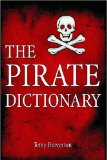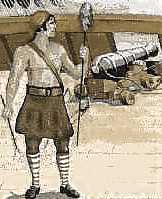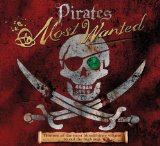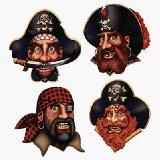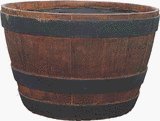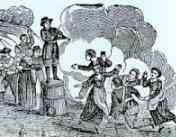Arrgh!

Pirate Talk, Pirate Slang, Pirate Lingo, Pirate Words
Ye want to talk like a freebooter or ye want to be espousing like a tried and true Buccaneer? Here be some jargon ye might want to be tryin' out. If ye know of a word this list be missin',
please send in on our way.
Here be some phrases that ye need know if ye want to not be mistaken for no landlubber!
Piratey Expressions
- Ahoy! or Ahoy there! - Used to hail a ship or a person or to attract attention - the pirate's version of Aloha, it often means "Hello!" or "Hi!" but can sometimes be used for "Goodbye."
- Arr! / Argh / Arrgh! / Yarr! / Harr! etc. - A general piratical term - can be used with anything.
- Avast - "Avast Ye!" - Used as a command to stop or desist, means "Stop and pay attention.", like, "Get a load of this." - from the Dutch term for 'hold fast'
- Aye - Yes. Aye, aye captain!
- Belay - To belay can mean either to tie something down tight and secure as with a belaying pin or to stop or ignore, as in, "Belay that last command."
- Black Spot - A death threat among pirates made of a black spot or mark on a scrap of paper with more specific detail sometimes written on the other side, referred to in the story, Treasure Island.
-
Blimey! Used to express frustration.
- Bucko - A friend.
-
Clap of Thunder - A strong drink.
- Dance the Hempen Jig - To hang. (The hanging rope was often made of hemp fibers.)
- Dead men tell no tales - Phrase explaining why pirates leave no survivors.
- Dungbie - The hiney or rear end.
- Gangway! Used to clear a passage through a crowded area.
- Go on Account - A tongue-in-cheek description pirates used that compared the act of becoming a pirate to going into business.
- Hang the jib - To look ill-tempered or annoyed. To pout.
- Hempen Halter - The hangman's noose.
- Hornswaggle - To cheat or defraud, often of money or belongings, Yosemite Sam knows a lot about it.
- Jolly Roger - Believed to be from the French words for pretty red, the Jolly Roger is the pirate's fabric calling card, often including a skull and crossbones. The Jolly Roger flag announces to your target that you are pirates, and that surrender is a good idea.
- Me - My. Me ship is the biggest brig in the port!
- Me hearties - My Comrade; boon companion; good fellow; a term of familiar address and fellowship among sailors. Captains often refer to their entire crew this way.
- Parley - A parley is a conversation between opposing sides to discuss a halt to the fighting or related matters.
- Shiver me timbers! - Akin to "Blow me down!", an expression of surprise, shock or disbelief, believed to come from the sound the ship made when 'shocked' by running aground or hit by a cannon blast.
- Sink me! - An expression of surprise.
-
Smartly - Quickly.
-
Splice the Mainbrace! - To have a Drink, or perhaps several.
-
Ye - You Ye be walking the plank!
-
Yo-ho-ho - Completely meaningless, but fun to say.
Are ye a landlubber or a corsair? Read on if ye don't know.
Piratey People Words
- Buccaneer
- Corsair A pirate; one who cruises about without authorization from any government, to seize booty on sea or land (Mediterranean Pirates).
- Deadlights Yer eyes, lad!
- Hand One who is part of a group or crew.
- Jack A flag or a sailor; showing how sailors would refer to thier ship's colors as one of the crew
- Jack o' Coins The paymaster or Quartermaster.
- Jack o' Cups The First Mate.
- Jack o' Staves The First Lieutenant.
- Jack o' Swords The Bosun.
- Jack Ketch A public executioner or hangman. To Dance with Jack Ketch is to hang.
- Jack Tar A popular colloquial name for a sailor (also called Jack Afloat).
- Lad A young man.
- Landlubber or lubber A person who lives and works on land or an inexperienced sailor; a sailor on the first voyage.
- Lass A girl or young woman.
- Matey Sociable; friendly. A way to address another pirate you are familiar with.
- Messdeck lawyer A know-it-all.
- Privateers A ship privately owned and crewed but authorized by a government during wartime to attack and capture enemy vessels.
- Scallywag A deceitful and unreliable scoundrel.
- Scurvy Vile; mean; low; vulgar; contemptible. Ye Scurvy Dogs!
- Sprogs Raw, untrained recruits or children.
- Squiffy A buffoon.
- Sutler A supplier.
- Swab A sailor, often a lout.
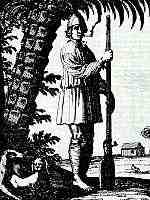 Ye know what thar things be? Piratey objects!
Ye know what thar things be? Piratey objects!
Pirate Object Words
- Booty Goods or property seized by force or piracy.
- Cat O'Nine Tails An instrument of punishment consisting of nine pieces of knotted line or cord fastened to a handle used to flog offenders on the bare back.
- Chantey, Shantey, Shanty A song sung by sailors to the rhythm of their movements while working.
- Cutlass A short heavy sword with a curved single-edged blade, once used as a weapon by sailors.
- Deadlights Eyes.
- Doubloons A gold coin formerly used in Spain and Spanish America. In Puzzle Pirates, a currency purchased with real money.
- Hempen Halter The hangman's noose.
- Jolly Roger A black flag bearing a white skull and crossbones; indicates a pirate ship.
- Letter of Marque A license to a private citizen to seize property of another nation.
- Pieces of Eight An old Spanish silver coin. In Puzzle Pirates, they are gold.
- Rope's end A piece of rope; especially, one used as a lash in inflicting punishment.
- Six Pounders Cannons.
- The Hulks Old or dismasted ships, formerly used as prisons.
Piratey Talk for Parts of the Ship
- Abaft - From the old English for 'on or to the aft', toward the back end or stern of the boat.
- Aft Short for "after." Toward the rear of the ship.
- Athwartships - At a right angle to the midline or centerline of the boat, which is an imaginary line drawn from bow to stern that equally divides the ship.
- Bilge - That part of a ship's hull or bottom which is broadest and most nearly flat, and on which she would rest if aground. Also - Stupid talk or writing; nonsense.
- Bilge Pump - A pump to draw the bilge water from the gold of a ship.
- Bilge Water - Water which collects in the bilge or bottom of a ship or other vessel. It is often allowed to remain till it becomes very offensive.
- Binnacle - From the Latin word for 'dwelling place', a box or case which houses the compass upon the deck.
- Charlie Noble - Upon finding that the stack for the ship's galley was copper, merchant captain Charles Noble then required it to be kept polished, the stack took his name thereafter. Old Salts would kid around with the new recruits and tell them to find or summon Charlie Noble.
- Coaming - A vertical rim surrounding hatch openings and such to keep any water on deck from entering below it, excellent for tripping on.
- Duffle - Everything a sailor owns, also the nickname for the bag which holds the everything.
- Fore Short for "forward". Toward the front end of the ship.
- Fo'c's'le - An abbreviation for forecastle, the forwardmost part of the ship.
- Futtock Shrouds - Pieces joining the rigging of lower and top masts.
- Head - A marine toilet, which could be no more than a hole cut in the decking at the head or bow of the ship that would allow waste to go into the sea, the waves hopefully washing away what may have not hit the water (also called a jardin), NOT the same as the poop deck!
- Holystone - Bars of sandstone would be used to scrub the decks, the softer areas of the stone would wear away and leave holes, also, the sailors were said to look like they were praying as they knelt to scrub.
- Jacob's Ladder - The rope ladder used to climb aboard the ship.
- Mast - A tall vertical spar, sometimes sectioned, that rises from the keel or deck of a sailing vessel to support the sails and the standing and running rigging.
- Mizzen or Mizzenmast - The hindmost mast of a three-masted vessel, or the mast immediately aft of the main-mast.
- Monkey - A small cannon...
- Monkey Jacket - A short waist jacket worn by midshipmen.
- Orlop - The deck for stowing cables.
- Poop Deck - The deck that is the furthest and the highest back, built on the upper deck and extending from the mizzenmast aft, usually above the Captain's quarters, NOT to be confused with the head!
- Port A seaport or the left side of the ship when you are facing toward her prow.
- Prow The "nose" of the ship.
- Rigging The arrangement of masts, spars, and sails on a sailing vessel.
- Rullock - The cutaway or notch on the side rail of the boat from which oars would pivot.
- Spars A wooden or metal pole used to support sails and rigging.
- Starboard The right side of the ship when you are facing toward her prow.

Piratey Talk for Crew, Names for Pirates-
- Boatswain - Often pronounced Bosun, this crew member was in charge of the deck, whether it be the crew, equipment, or activity on the deck.
- Cockswain - Originally the Captain's attendant who would row him to and from the ship, later came to mean the helmsman.
- "Drivelswigger" - One who reads about nautical terms too much.
- Freebooter - From the Dutch for 'free' and 'plunder', reference to a pirate.
- Jack Tar - Early sailor's tarpaulin clothing was infused with tar, which some say also deflected sword blows in addition to shedding water, similar to Joe Blow or John Q. Public.
- Landlubber - 'Lubber' was an old English word for a big, slow, clumsy person, and this term was aimed at those persons on ship who were not very skilled or at ease with ship life, as if to say, "You were no better on the land."
- Marooner - Besides a reference to the poor soul marooned on an island, it also can refer to a pirate who found his current line of work after deserting a military position or perhaps a state of slavery.
- Picaroon - From the Spanish word for rascal, it was applied to a form of verse about pirates that was satirical or humorous.
- Powder Monkey - A gunner's assistant...
Know what we pirates are doing? Read on and ye will!
Action Words
- Black Spotted Similar to being black balled, it marks a pirate for death.
- Careen To lean (a ship) on one side for cleaning, caulking, or repairing.
- Chain Shot Two cannon balls united by a shot chain, formerly used in naval warfare on account of their destructive effect on a ship's rigging.
- Chase To engage in pursuit of quarry or the ship being pursued.
- Heave To To turn a sailing ship so that its bow heads into the wind and the ship lies motionless except for drifting, in order to meet a storm.
- Hornswaggle To cheat.
- Keelhaul To haul under the keel of a ship, by ropes attached to the yardarms on each side, used as a punishment.
- Marooned To put ashore on a deserted island or coast and intentionally abandon.
- Overhaul To gain upon in a chase; to overtake.
- Scuttle To cut or open a hole or holes in a ship's hull or to sink a ship by this means.
- Titivate To clean up or make shipshape.
- "To Be Three Sheets in the Wind" Casting out all three sails, causing the ship to shudder and stagger like a drunken sailor.
- Walk the plank To be forced, as by pirates, to walk off a plank extended over the side of a ship so as to drown.
- Weigh anchor Heave up an anchor in preparation for sailing (can be used for to leave port).
Pirate Talk for Crew Activity
- Swing the Lead - A lead weight swung from a line into water when near shore was a way to measure depth, the job's simple requirements caused the phrase to evolve into a term for slacking off.
- Take a Caulk - The deck's gaps were sealed with oakum and tar, and napping on them would leave black lines on the clothes. Someone going to nap on deck could say they were going to "take a caulk."
Pirate Slang for Drink
- Arrack - A strong drink made with fermented fruit or palm sap, rice, or molasses.
-
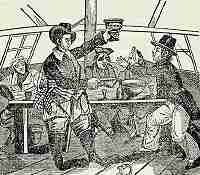 Black Jack - Large drinking cups made of leather that were made
stiffer with an application of tar.
Black Jack - Large drinking cups made of leather that were made
stiffer with an application of tar.
- Bumboo - A drink of the West Indies made with watered rum and flavored with sugar and nutmeg.
- Grog - The nickname of a British admiral was applied to a mix of water and rum, the rum was a cheap antiseptic and flavor mask for the spoiled water that sailors often encountered while at sea.
- Hogshead- A large barrel or cask holding 63 to 140 gallons, usually referring to alcohol.
- Rumfustian - Raw eggs mixed with beer and liquor...NOT the breakfast of pirate champions.
Pirate Food
- Cackle Fruit - Chicken eggs...
- Doughboy - Simple dumplings made of flour and animal fat.
- Hardtack - Extremely hard crackers made of only flour, water, and salt. Hardtack would keep for years if dry, but dry was not on a ship, so they often grew maggots or other worms. Also called: hardbread, ship's biscuit, tooth dullers, molar breakers, sheet iron crackers, and worm castles.
- Junk - Salted beef or pork. This isn't freshly cooked and prepared meat. The salt was intended to preserve it inside a barrel. It got hard... real hard. (see hardtack)
- Leather - That's right, dear readers. The food of last resort was not even food, but animal hide.
- Salmagundi - A popular dish of chopped meat ( beef, fish, chicken, pig, turtle, etc.), eggs, anchovies, onions, grapes, cabbage or herring, seasoned with salt, pepper, garlic, oil, vinegar.
Pirate Slang for Death
- Davy Jones's Locker - the imaginary place at the ocean bottom that holds dead sailors and pirates...a reference to death. Davy Jones was said to be an evil spirit lurking at sea, waiting to escort dead sailors or pirates to his place or locker at the bottom of the waters. He went on to have a successful music career with the Monkees many years later.
- He's gone to Davy Jones's locker He is dead. (Davy Jones's locker is also the bottom of the sea)
- To be in Davy's Grip: To be close to death, or frightened.
- To have the Davies or the Joneseys: To be frightened.
- To see you to Davy Jones: To threaten to kill some one.
The Pirate's Realm
A pirate crew could be made up of many various positions, and it could also have people with different skill levels and reasons for being a crew member. Some of the crew could be hard core pirates from a young age; some could be recently unemployed sailors, and others might be forced into the pirate crew against their will. The size of the crew might vary, based on the ship size, the success of their piracy, and how well they fight.
Captain- The background of many pirates was as a sailor in one of the European navies, and from their service under autocratic commanders, they developed a strong hatred of their incompetent and abusive style.
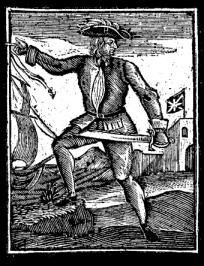
A pirate Captain had to be cut from a different mold, because previous experience had taught most that life at sea was harsh enough without an inexperienced or cruel leader making it worse. He was elected as a sort of president of this shaky democracy, someone already respected for their leadership and navigation skills who would be level-headed and decisive with the pirate crew in the heat of battle.
It was during engagements that this pirate of pirates would be expected to rise above and help bring victory, but in most other occasions on ship, he was more or less another voting member in the pirate crew, delegating most of the everyday tasks to the quartermaster or other junior officer. In these times, he was to be an even-tempered father who maintained the barest level of discipline necessary to hold the family venture together. This father could be voted out and even thrown off if he became passive or wavering, went against the majority vote, became too brutal, or simply no longer performed his duties to the liking of the pirate ship crew.
First Mate - A pirate crew sometimes had this position as the captain's right-hand man and the one who would assume his role if he were killed in battle or could no longer perform his duties. This was often considered the job of a lieutenant in a regular navy, and most pirate crews chose a quartermaster instead of a First Mate.
Quartermaster - Out of their distrust of dictatorial rule, pirates of the Golden Age placed a large portion of the captain's traditional role and power into the hands of an elected quartermaster who became second-in-command and almost a co-captain through his representing the best interests of the crew.
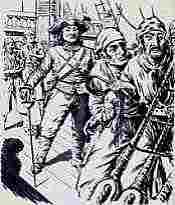 As a foreman, he was in charge of maintaining order, distributing rations and supplies,
delegating work, and guarding and dividing plunder. In fighting, the quartermaster decided what ships were worth it and often led any boarding party, ultimately deciding what loot to keep. When
discipline or punishment was necessary, only he could give it, but even then it was with the agreement of the captain or the vote of the pirate crew.
As a foreman, he was in charge of maintaining order, distributing rations and supplies,
delegating work, and guarding and dividing plunder. In fighting, the quartermaster decided what ships were worth it and often led any boarding party, ultimately deciding what loot to keep. When
discipline or punishment was necessary, only he could give it, but even then it was with the agreement of the captain or the vote of the pirate crew.
In the worst of situations, he was a sheriff enforcing fairness in duels or a judge presiding over jury trials for serious crimes committed among the crew. For all his hard work, the quartermaster received a larger portion of any plunder and would often be asked to command any highly valued ship taken in battle.
Boatswain (bos'n) - This position may be compared to the modern chief petty officer. A ship of any size would require the boatswain to oversee several junior officers who would share his responsibility for the crew's morale and work efficiency as well as the maintenance and repair of the hull, rigging, lines, cables, sails, and anchors.
A gunner would be the leader of any separate group manning the artillery. His special skill would be in aiming, but he would oversee the four to six men required to take the gun through the steps of loading, aiming, firing, resetting, and swabbing for the next load. He would also work to ensure the gun crew's safety in avoiding dangerous overheating or excessive recoiling of the weapon. A master gunner would help to coordinate the timing and accuracy of the individual crews, especially when a broadside was ordered.
Powder Monkey - This term was first used in the British Navy for the very young men who made up most gun crews in the 17th century. In contrast to a pirate officer who was elected, these poor souls were forced to perform what was some of the most dangerous work on the ship. They were harshly treated and rarely paid, and if they avoided being mortally wounded in their service, desertion was probably as attractive as having very little hope of being promoted in the pirate crew.
Carpenter - There could probably be no more highly regarded artisan in a pirate crew when your life and livelihood depended on the soundness of the wood around and beneath you. A person in this apprenticed trade would use their skill to not only repair battle damage to masts, yards, hatches, and the hull, but to keep the ship's leaky seams in check with wooden plugs and oakum fibers. He would often have separate quarters combined with a workspace. Each carpenter would usually have an assistant in apprenticeship.
Surgeons, Cooks - Yet another highly valued position, surgeons would often be grabbed from crews of captured ships, although they would not be ordinarily be asked to sign the articles. He would be expected to deal with colds, fevers, or sexual diseases with an assortment of mercurial medicines or other current treatments, and the carnage of battle often required amputations in hopes of saving the wounded.
It seems that the ship was possibly more valued than life or limb when there is no mention of substitute carpenters, but for lack of a surgeon, a carpenter or even a cook would be asked to fill in. A carpenter would be certain to have the similar tools and cutting experience, but a cook as a surgeon would be quite a stretch.
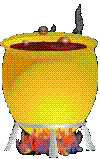 More
often than not, a cook would be a disabled pirate who was allowed to stay on ship if he could make food that didn't kill the pirate crew. Perhaps it was felt that if a pirate crew survived his
cooking, he could make something to help heal as a stand-in surgeon.
More
often than not, a cook would be a disabled pirate who was allowed to stay on ship if he could make food that didn't kill the pirate crew. Perhaps it was felt that if a pirate crew survived his
cooking, he could make something to help heal as a stand-in surgeon.
Cooper - If a pirate captain was fortunate enough to have a prosperous career, perhaps he could afford the services of a cooper, a barrel maker. Most everything not in a crate or canvas bag was in a barrel. Using steel hoops and strong wood, the cooper would make containers to keep gunpowder dry, food free of pests, and water and spirits from leaking into the bilge. With a changing environment and the constant shifting of the cargo, the hoops and staves of the barrels required constant upkeep to remain intact and tight.
Musicians - Those who could play drums, bagpipes, trumpets, accordions, fiddles, and other instruments were so well liked that they escaped torture if captured by pirates. With entertainment at a premium on most uneventful days at sea, they would be expected to play a jig to dance to, lead a shanty for work tempo, or provide dinner music. Musicians would usually play prior to and during a battle, blaring out martial tunes, nautical favorites, or simple loud noise to inspire the crew. Bartholomew Roberts wrote a provision in his articles stating that regular Sabbath rest should be provided for his musicians. Roberts was known for his good treatment of his pirate crew.
